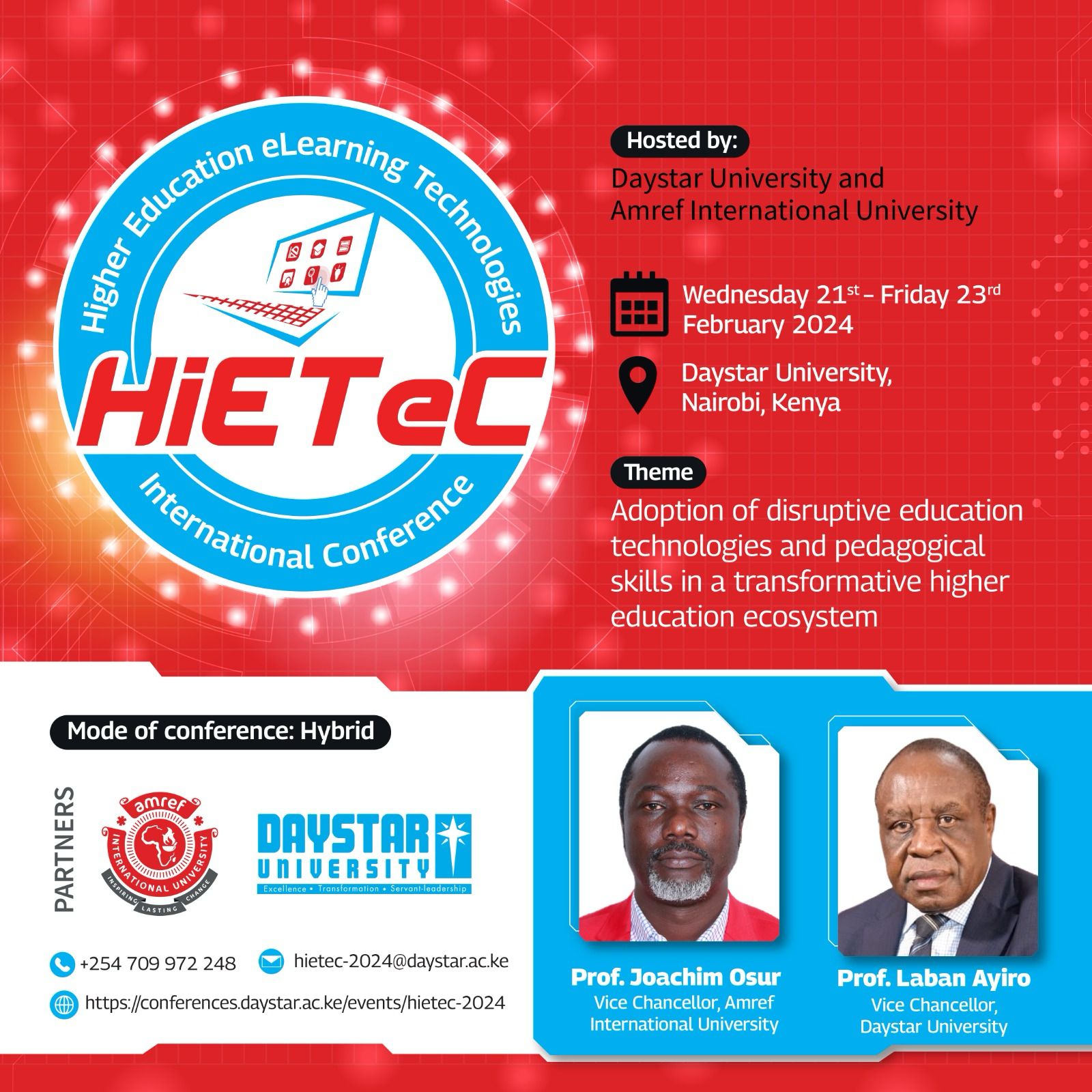Higher Education e-Learning Technologies International Conference, 2024 (HiETeC-2024)
Event Date February 21, 2024 to February 21, 2024 in events

To achieve substantial output from HiETeC-2024, we can no longer compete but collaborate. Therefore, HiETeC-2024 will be cohosted by Daystar University (DU), Amref International University (AMIU), & Kenya Education Network (KENET). Both Daystar University and Amref International University prides in having ODeL centers that are approved by the Kenyan Commission of University Education (CUE) to deliver virtual training programs. Both Universities have established a Pan-African niche in delivery of higher education. The Kenya Education Network (KENET) is currently hosting Learning Management Systems (LMS) for close to 35 middle level and higher education among other ICT support and internet services in Kenya.
Disruptive Technologies in Education
The post-modern society is increasingly growing to be at home with the terminology of disruptions. Reference to the term ‘disruption’ is hereby used in the sense of a radical change to an existing model, system, industry, or even market due to emerging innovations. Recent disruptive technology examples include e-commerce, online news sites, ride-sharing apps, and GPS systems. In their own times, the automobile, electricity service, and television were disruptive technologies.
Just like the 19th Century industrial revolution in Great Britain, Europe, and the United States, education has witnessed enormous transformation in the 21st Century world. For example, Distance Learning (DL) has revolutionized the way we think about and access education, teach and learn. The emergence of technology has played a big role in enhancing Distance Learning (DL). Further, technological advancement has seen major transformation of education technology which consequently has impacted Distance Learning. According to Tim Smith (Investopedia, 2022), disruptive technology is an innovation that significantly alters the way that consumers, industries, or businesses operate. A disruptive technology sweeps away the systems or habits it replaces because it has attributes that are recognizably superior. This technological advancement of education technology is what is being referred to here as disruptive technology
Engagement and Relevance.
HiETeC-2024 conference will be a three days in-person event (500 people in the Daystar University DAC auditorium, Nairobi-Kenya) with a livestream virtual-event (of approximately 3500 people globally) taking place concurrently. The online presence will integrate blended participation with pre-conference recordings made available on the HiETeC-2024 website for earlier engagement by the delegates. The conference seeks to bring together other Higher Education Institutions (HEI), education leaders and think tanks, education technology innovators, leaders and hubs, international bodies and non-governmental organizations involved in higher education and stakeholders: graduate, and postgraduate students from across the world.
Post COVID 19 Pandemic, anecdotal evidence has revealed that higher training institutions especially in developing countries are rapidly transitioning from traditional teaching to embracing the emerging education technologies. Education Technologies are no longer a fancy bell and whistle to bring students into colleges, but rather a transformative resource geared to differentiating and making instruction more effective. Digital Learning tools and technology have proven to enable learners develop effective self-directed learning skills coupled with ability to identify what they need to learn using online resources, apply the information to solve problems and evaluate resultant feedback individually and in groups (peer learning). The hallmark of all this is to make learners creators and not mere consumers of knowledge.
Currently, young people in Africa represent 60% of the population. They are the key to changing the fate and future of the continent, yet only 40% of all people in Africa are educated, meaning we lose 60% of all human capital by the age of 18. Undeniably, disruptive learning innovations have inherent potential to bridge the inequalities that affect access to higher education. HiETeC-2024 conference provides the platform to examine the emerging disruptive education technologies and the challenges higher education institutions (especially in developing countries) are reckoning with while adopting the emerging education technologies. The conference will further offer a platform to learn from research driven lessons and best practices through networking with global leaders in use of disruptive learning innovations.
Target audience
In-person 500 / online over 3500 delegates
- Governments (Ministries of Education, ICT and innovations)
- Education Technology companies
- Policy makers in ICT space
- Content creators, websites developers and designers
- Experts in Distance Learning (DL)
- Corporate social responsibility professionals
- Students from higher education institutions
- Instructional designers
- Telecommunication companies
- Regulators for Distance Learning (DL)
- Academicians (faculty members) from higher education sector
Call for Papers
To this end, HiETeC-2024 will engage the earlier mentioned HEI stakeholders in conversations under the theme “Adoption of disruptive education technologies and pedagogical skills in a transformative higher education ecosystem.” The conference organizers call for paper presentations framed in and around the following 6 sub-theme areas:
- The role of emerging disruptive education technologies in optimizing learning outcomes
- Stimulation of social learning through digital innovations in higher education
- The catalytic effect of disruptive education technologies and pedagogies in attainment of SDGs
- Application of online pedagogy to impact on learners’ behavior in distance education
- The role of strategic partnerships and collaborations in delivery of distance education
- Innovative disruptive technologies and pedagogies for special populations

